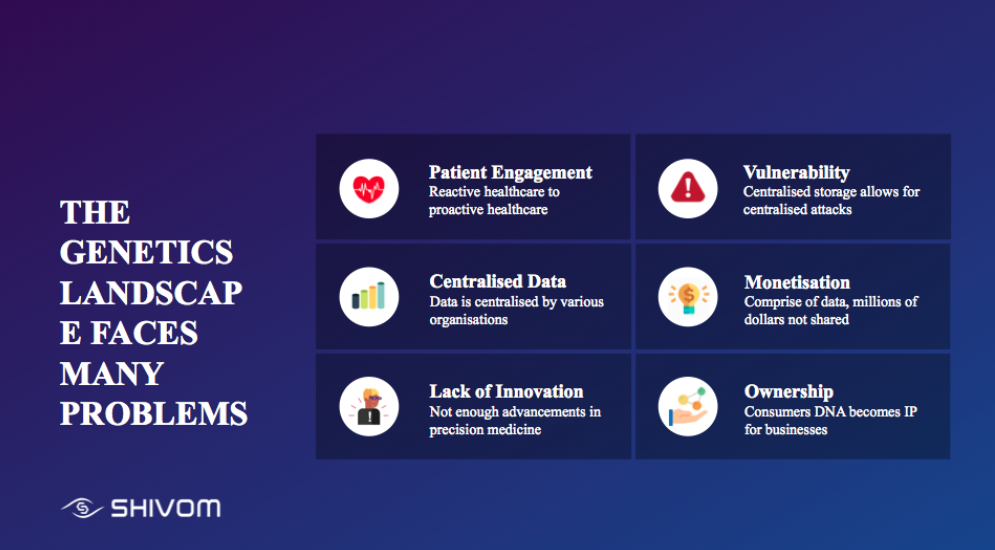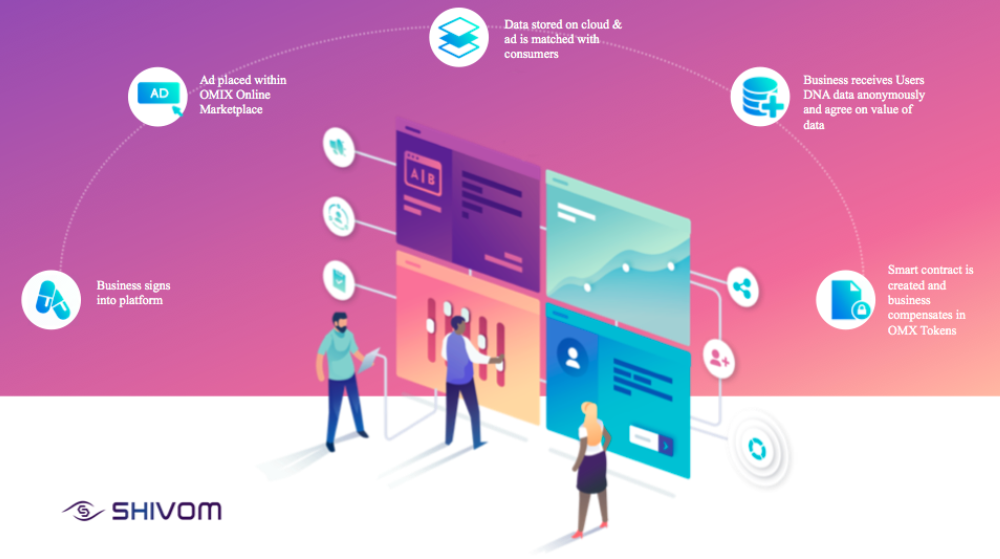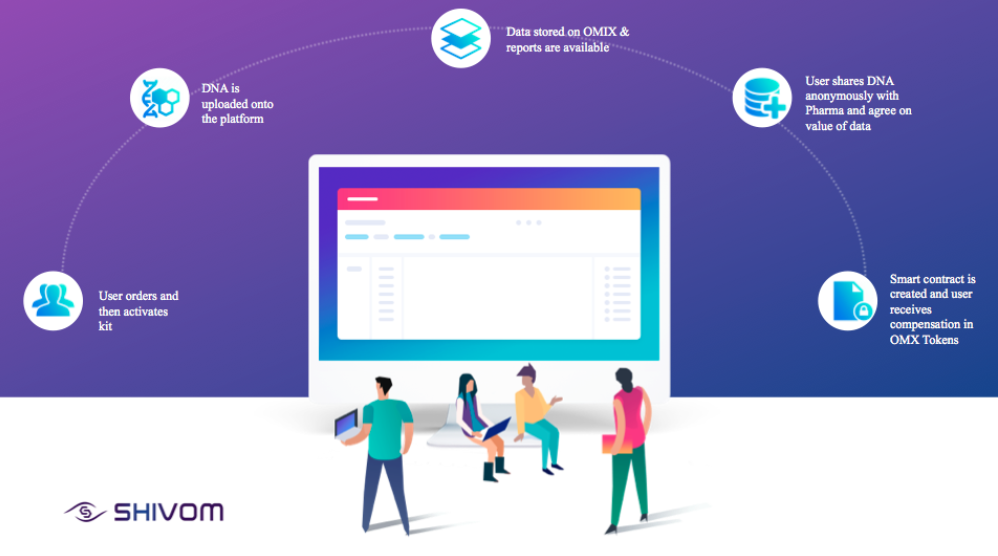
At a time when discussions about data privacy and security are more important than ever, there is one particular type of data that is raising concerns: the DNA. The genetic code is what makes each individual unique. It possesses information about our ancestors, our health status, our environment and our future. Everything that defines us as individual lies in the spirals of our DNA.
Imagine the life-saving treatments that we could create by gaining access to the information stored in our genome. We could even remove certain diseases by cutting them out of our DNA. Hacking the human genome seems very exciting. But this is where ethical concerns appear. How far can we go in exploring and manipulating our genetic code? What control should we be granted over our DNA and the data that it can provide? Do we own our genome and therefore, can we monetize it?
Various startups are currently trying to bring answers to these burning questions. Some with biomolecular solutions, some with physics and others with digital technologies. Among these digital tools that promise to revolutionize healthcare, Blockchain is starting to gain a solid reputation. How is the technology behind Bitcoin going to address the challenges of genomics, you might ask? Well, Shivom, the startup that we have interviewed, will shed some light on this topic.
Shivom is a blockchain-based genomics startup and marketplace that creates an entire ecosystem for next-generation genomic services. The strength of this project is the central place it gives individuals, by empowering them to entirely control the access to their genomic data.
Intelligent HQ (iHQ): Tell us more about Shivom’s history and what lead to the creation of the company.
Shivom (S): The conceptualization of the project began in December of 2016. The name ‘Shivom’ is partly derived from the Indian terms ‘Shiv’ and ‘Om’, both meaning destruction and (essence of) life. We chose this name as it relates to our vision for the distant future of mankind, helping to destroy every disease and foster new life.
Shivom is the next evolutionary step in the fields of genomics and blockchain, bringing both technologies together. For the first time ever, an ecosystem will offer an open web marketplace, in which other providers can add their apps and services, alongside genomic data analytics and personalized medicine.
iHQ: Access to medical data and particularly genomic information will be crucial in the next years with the emergence of precision medicine. How is Shivom addressing this challenge and what differentiates your company from other startups in this space?
S: There are indeed several other groups interested in putting genomic data on blockchains, which primarily, proves our value proposition. However, none of the other teams have a similarly all-inclusive business model.
Most startups often have only domain-specific experience in some areas, lacking the well-rounded nature necessary to build a sustainable company. While they may have a business perspective in some niche areas, Shivom has a comprehensive business model, leveraging game theory and network effects to establish a fully-integrated healthcare service system with long-term sustainability and the possibility for users to monetize their data.

Several of the other start-ups rely on outdated blockchain models (e.g. Bitcoin) and do not have detailed blockchain experience, instead relying on third party blockchain providers such as MultiChain. Some of them use closed proprietary systems that will kill all network effects, or are too complicated and not user-friendly. Because a huge genomics ecosystem needs to consider that massive data sets must be analyzed to be useful, other platforms will likely fail because of architectural flaws related to scalability and accessibility.
Our team already has experience in building highly scalable precision medicine and bioinformatics platforms. To that end, we do not regard other genomics groups as competition; rather, we invite them to work with us to form a better and stronger genomics ecosystem to collaboratively create seismic changes in how individuals receive medical care and how therapies will be developed.
We have an entirely global vision, with the goal of integrating multiple services into one interconnected ecosystem. We aim to leverage collaboration and partnerships to make this happen in an open and transparent way, truly utilizing the complete set of benefits that blockchain technology has to offer. While this is a grand vision, it’s not entirely out of reach, and we have put together a business plan and team that’s capable of executing this on a global scale.
iHQ: You have recently announced a pilot with diagnostic partner Genetic Technologies Limited in the province of Andhra Pradesh to collect genetic data from type 2 diabetes patients. How exactly is this data stored and what is the role of blockchain technology?
S: Our users’ DNA data is protected through the combined effort of both blockchain technology and secure encryption. From the consumer permissions settings, you can authorise certain institutions, businesses or individuals to view, search or contact you at any given time.
iHQ: What is Shivom’s business model?
S: Shivom is building an ecosystem that involves distributed ledger architecture, whilst other partner companies will add apps and services to a genomics storage and analytics platform. The omics and health care database that we are building will play a central role in this ecosystem and provide a significant portion of the value.

iHQ: What types of services, besides storing genetic data, do you provide?
Our OMIX platform utilises blockchain and smart-contract technology to verify ownership of DNA data and authorise transactions between both consumers, enterprises and research organisations. Blockchain is a new technology which has demonstrated an encrypted and de-centralised architecture to authorise, trace ownership and protect privacy; which is not currently available with centralised technologies. This is important to our users, who will now have ownership and total control of their own DNA data; all the while being able to control who has access at any given time.
iHQ: You have signed various partnerships with companies such as SingularityNET. What should we expect from these collaborations?
S: Shivom continuously seeks to enhance the uniformity and credibility of blockchain system. Through our partnerships with companies like SingularityNET, we recognise the enormous potential of blockchain to revolutionise healthcare, and this partnership (as well as our partnerships in general) aims to develop best practices and standards that promote consistency and uniformity throughout the blockchain community.
The idea behind this future global movement is that a whole pharmaceutical ecosystem can be transposed on top of a blockchain network, paving the way to trusted and open R&D processes and trusted transactions between parties, powered by the collective self-interest of a global community of independent investors.
iHQ: Shivom has a big focus on securing genetic data with blockchain technology. Are you looking at collecting other type of wellbeing or health data in the long term?
A core focus of our long-term plan is the establishment of a highly scalable ‘open-source’ research and drug development organization, for the development of more effective, less costly, and safer therapeutics and precision medicines (especially for low-income populations).
Shivom will primarily concentrate on age-related diseases (dementia), diabetes (overweight), and cardiovascular diseases. With the availability of comprehensive “omic” assessment of an individual, including one’s genome, microbiome, epigenome, metabolome, proteome, or autoantibodies, it has become clear that each of us has truly one-of-a-kind biological content. Collecting this individual health data provides Shivom with a remarkable and unprecedented opportunity to improve medical treatment and develop preventive strategies to preserve health, opening completely new business prospects.

iHQ: How do you communicate with patients and what are their main concerns, if any, when it comes to sharing their genetic data?
S: Our platform notifies our patients when an enterprise has requested to view, search or contact the patient/DNA data file. It’s up to each individual to decide whether they would like to proceed and allow the enterprise to go further or revoke access. The main concern our patients have when it comes to sharing genetic data is being able to understand who has access, how can he/she revoke access and what rewards/contributions will they receive for sharing.
iHQ: Shivom is present in various countries such as the US, Germany or India. What differences do you see in the may new technologies and medical data is addressed?
S: It varies, depending on mindset of people living in a given area. For example, people living in US and Germany are likely more familiar with blockchain and genomic research as compared to the people living in India. They tend to be more inclined towards this sort of research, as they’re more aware of its value. Therefore, the approach needs to be tailored when addressing different countries.
iHQ: What is for you the main obstacle to implement blockchain technology on a large scale in the healthcare industry?
Currently, clinical pilots do not have routine access to robust amounts of ethnically diverse data sets. Shivom’s platform and technology solutions will help to unlock siloed datasets globally and provide enterprises with enhanced data provenance and opportunities to securely source and analyze datasets around the world.
iHQ: What are the next milestones in Shivom’s development?
In November 2018, Shivom will be releasing an Alpha product which aims to showcase one of our USP’s – secure storage of DNA data. Following this release, our team will be focused on finalising our roadmap for the year ahead and launching a new website, inline with our OMIX platform.
Here are some of the other updates, presented by our CEO Henry Ines

My name is Anca Petre and I am a Pharm. D and Business double degree candidate at Université Paris-Saclay and INSEEC Business School in London and Paris. In my own work, I primarily focus on the crossroads between healthcare and digital technologies. I am currently working on a research about the possible applications of Blockchain in Healthcare and I contribute to Blockchain Age and Intelligent HQ.
I particularly enjoy working the sectors’s startup environment. I have previously worked at e-ssencials, a startup which develops digital solutions for patients with chronic diseases. I have also participated in three hackathons to help develop and further innovate the healthcare circuit.
I worked at Sanofi in the Biotechnologies Department where I successfully managed to reduce the production time by half for several products.
At university, I am the founder and president of the Speak Up ! Association which allows over 500 students to improve their public speaking skills.


























